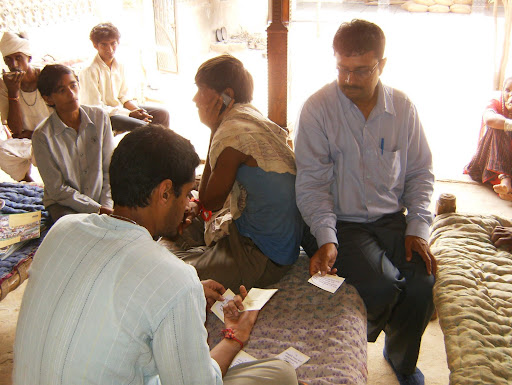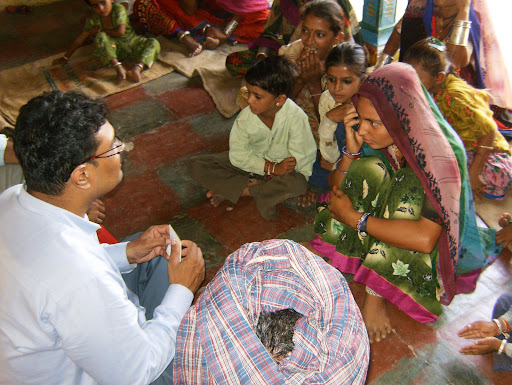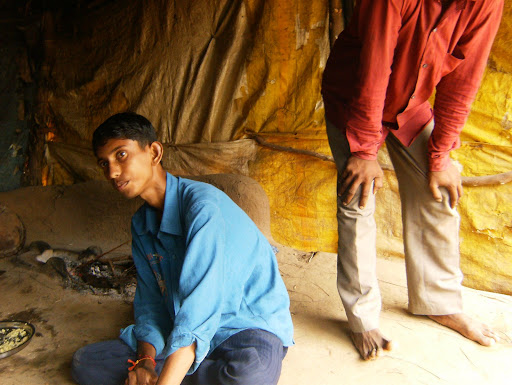The best part about working with farmers is that they are amazing people. Incredibly warm, generous, humorous, and humble. It is really easy to stay motivated to work hard on a daily
Over the past two summers, I have gotten to know many farmers. In fact, I would venture a guess and say I personally know about 100 farmers in Gujarat. And among them are some of the most thoughtful and progressive farmers in all of India. I've written about Sarvadamanbhai before, who I believe has the most advanced farm in Gujarat. I've visited big farms, small farms; organic farms and chemical farms.
A couple weeks ago I did a field visit with Pareshbhai and my manager from IBM, who visited DSC from Delhi for a few days. My manager afterwards said the day (which went from 6am to 1am) was "a lifetime experience". I know what he means. Anyway, I wanted to tell in words and pics about some of the memorable stories from the field.
We traveled about 600 km in total in the day, and went to really remote villages. At one point we were 25KM from the Pakistan border!
Our goal for the trip was to meet with farmers and discuss how they access information about their agricultural practices, what information they need, how best to deliver it to them, and challenges they currently face in accessing it. We did this in many ways, including free-form discussion, and a questionnaire I had prepared. We went to three villages, and in each place local farmers had organized meetings so that we could address a group. This pic is of the biggest meeting of the day, in a village called Beyok in Banaskantha jillo (district):
Notice how they set up the cots and sat around us in a circle. Also interesting was that the ladies, whom we expressly invited to be a part of our meeting, all sat on the ground outside of the circle.
We also discussed the radio program and what they thought about getting information over the phone. Then we went into specifics about our project. I prepared a paper prototype of the voice user interface that we have designed:

We did the naatak several times, with some very interesting results. People were nervous, and some didn't get what we were doing, but on the whole we concluded that the basic interaction is going to work. In our third village, we met a women-only group and did the naatak:
 This was totally fascinating. We learned that the ladies don't own phones themselves, and rarely use them. Moreover, they are very intimidated by the phone, expressing that they were not educated enough to even dial a number.
This was totally fascinating. We learned that the ladies don't own phones themselves, and rarely use them. Moreover, they are very intimidated by the phone, expressing that they were not educated enough to even dial a number.Doing the naataks made me wonder whether we were doing something completely new. After thinking about it some more, I've come to believe that we are designing the first ever voice interface in the Gujarati language. Cool!
The final story I wanted to share is about a farmer named Babubhai. Babubhai is 18 years old. He has been featured on DSC's quarterly magazine, Divaa Dandee (meaning "Lighthouse", a
 name given by a farmer) many times for his progressive farming practices. He has given speeches in front of high-level government bureaucrats without flinching in meetings organized by DSC. But the thing that amazes me most about Babubhai is that he is a born leader. Watching him interact with the other people in his village is a sight to behold. He commands the all-out respect of each and every person in the village, from the youngest to the village elders. He is a peer amongst the grown men in the village. They all go to him for advice about their farms, and he has no hesitation about telling them what to do. Also, it is clear that each and every person in his village are gushing with pride for him; they recognize that he is very special.
name given by a farmer) many times for his progressive farming practices. He has given speeches in front of high-level government bureaucrats without flinching in meetings organized by DSC. But the thing that amazes me most about Babubhai is that he is a born leader. Watching him interact with the other people in his village is a sight to behold. He commands the all-out respect of each and every person in the village, from the youngest to the village elders. He is a peer amongst the grown men in the village. They all go to him for advice about their farms, and he has no hesitation about telling them what to do. Also, it is clear that each and every person in his village are gushing with pride for him; they recognize that he is very special.Babubhai is also an inventor, and he showed us the latest thing he has built:
It is a insect trap that he puts out in his field. It is actually three traps in one. There is at the top a water bowl to attract birds, who in turn hunt around for bugs on the plants. Then there are posts on the sides to hang faramine traps. In the middle he has fixed a small light bulb that attracts insects, and right underneath it is where he puts a bowl of another trap which the bugs fall into. He told us that he wants to take his invention and share it farmers around the world.
I would consider Babubhai a genius, in the mold of Ramanujan. He is a diamond in the rough. I feel lucky to know him and work with him. Despite having only a gradeschool education, Babubhai plans on going to college and studying social work. I have very little doubt that he will eclipse anything I will ever do for the upliftment of rural Gujarat.
No comments:
Post a Comment